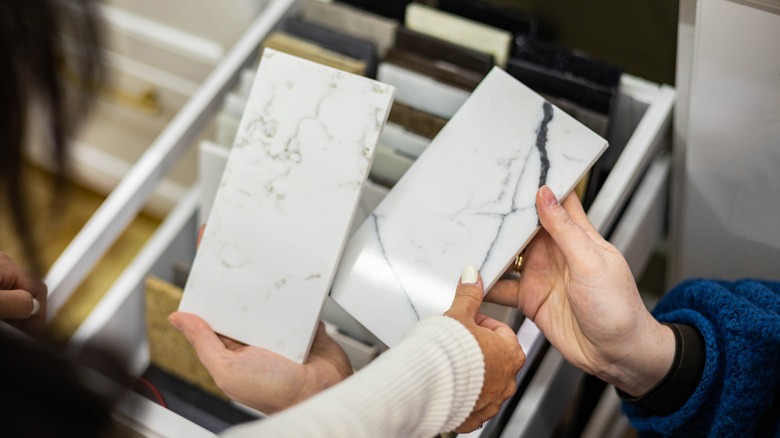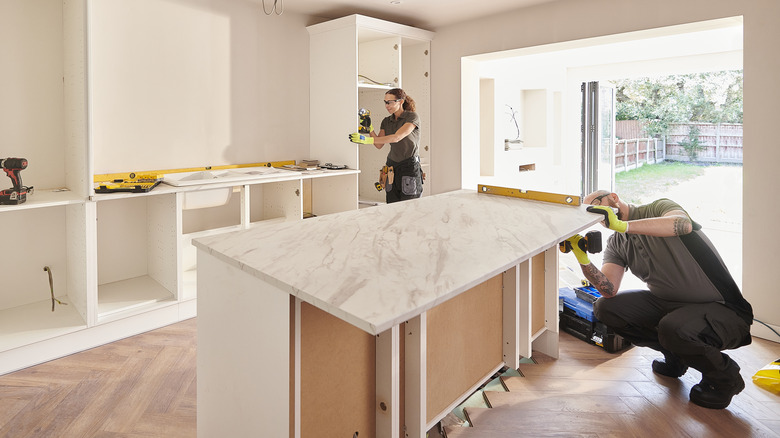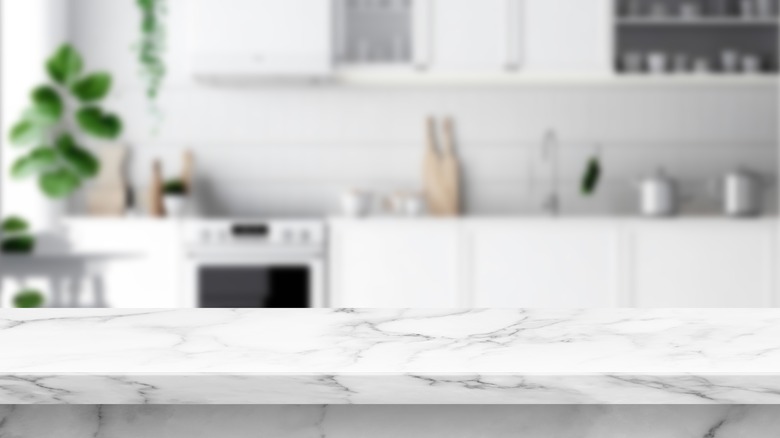Think Twice Before Installing Porcelain Countertops. Here's Why
Porcelain, though a relatively new concept in the world of countertops, has gained popularity among homeowners due to its marble-like look. Moreover, this manufactured material is nearly 30% stronger than granite and incredibly durable. Its heat resistance also makes it one of the best types of tile for your kitchen countertop, allowing you to place your hot pans and pots on the surface without concern. However, despite the long list of pros, you should think twice before installing porcelain countertops.
One of the most significant drawbacks of these manufactured countertops is their limited availability. Since they're pretty new and not a go-to option like granite, marble, or quartz, they're not readily available, as their supply is limited. So, you may have to search high and low for this material. Another significant con is that these countertops are slightly porous and can get stained under extreme circumstances. Plus, porcelain isn't impervious to scratches or cracks. But the buck doesn't end here. There are other factors you should consider before you install porcelain countertops.
The cost of porcelain countertops
One of the main things to consider when choosing porcelain countertops is the costs involved. You can expect to pay between $1,500 and $3,800 for installing 35 square feet of this manufactured material. This estimate includes material and installation costs since these countertops aren't exactly DIY-friendly. On average, you'll have to shell out $20 to $65 per square foot of porcelain. The price will mainly depend on your customization demands from the fabricator. For instance, you'll have to pay nearly 50 to 100% more for bespoke pieces than regular ones.
Regarding labor, expect to pay between $10 to $20 per square foot. While you can save these expenses if you install them yourself, it's not recommended, as the thin material usually comes in the form of long slabs that can crack during cutting. If this happens as part of your DIY project, you'll have to cover the costs. But if you contract a professional to install the countertop for you and the material sustains damage, it'll be the expert's liability. This is also why the labor costs are high for this countertop, and you'll have a hard time finding dependable contractors for the job. Moreover, tailored cutouts will cost an extra $100 to $200 per piece, potentially throwing your budget in disarray. An island design and acquiring a kitchen remodel permit can increase the investment further.
Limited edging options and susceptibility to cracks and scratches
Since porcelain countertops are just ¼ inch (6 mm) or ½ inch (12 mm) thick, they have limited edge options. While you can opt for round, ogee, beveled, straight, waterfall, and platner, these won't look good with the countertop material. This is because the design and pattern aren't integrated throughout a porcelain countertop (even though the color is). It's usually added to the top of the slab to make it appealing to the eyes. So, not all edge options would show the design and might look odd from certain angles. This is why these slabs are often mitered to give it a square edge (and make it look thicker than it is) and ensure the pattern is visible throughout.
Another thing to consider is this countertop's susceptibility to cracks and scratches from blunt objects. While a porcelain slab is incredibly durable and doesn't wear and tear easily, impact from ceramic knives, meat cleavers, or hammers can scratch the surface or chip the slab. This wouldn't be a big issue if you could cover the scratches or chips yourself. But you can't and will have to get a professional. Further, these countertops might also impact the resale value of your home if you're thinking of listing it soon, as they don't fall in the same luxury countertop category as granite.


